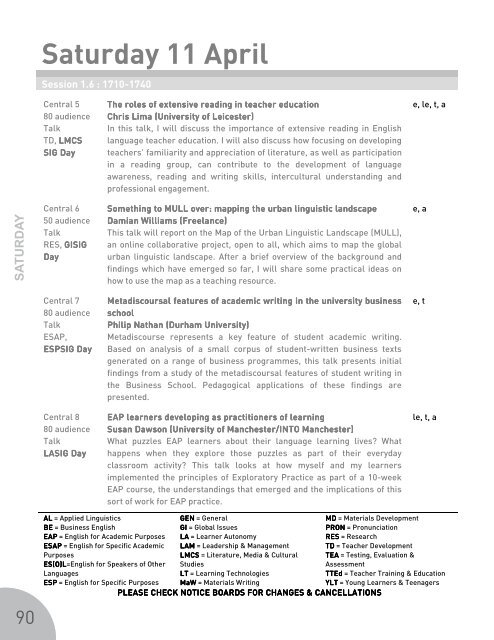Create successful ePaper yourself
Turn your PDF publications into a flip-book with our unique Google optimized e-Paper software.
Saturday 11 April<br />
Session 1.6 : 1710-1740<br />
Central 5<br />
80 audience<br />
Talk<br />
TD, LMCS<br />
SIG Day<br />
The roles of extensive reading in teacher education<br />
Chris Lima (University of Leicester)<br />
In this talk, I will discuss the importance of extensive reading in English<br />
language teacher education. I will also discuss how focusing on developing<br />
teachers’ familiarity and appreciation of literature, as well as participation<br />
in a reading group, can contribute to the development of language<br />
awareness, reading and writing skills, intercultural understanding and<br />
professional engagement.<br />
e, le, t, a<br />
SATURDAY<br />
Central 6<br />
50 audience<br />
Talk<br />
RES, GISIG<br />
Day<br />
Something to MULL over: mapping the urban linguistic landscape<br />
Damian Williams (Freelance<br />
Freelance)<br />
This talk will report on the Map of the Urban Linguistic Landscape (MULL),<br />
an online collaborative project, open to all, which aims to map the global<br />
urban linguistic landscape. After a brief overview of the background and<br />
findings which have emerged so far, I will share some practical ideas on<br />
how to use the map as a teaching resource.<br />
e, a<br />
Central 7<br />
80 audience<br />
Talk<br />
ESAP,<br />
ESPSIG SIG Day<br />
Metadiscoursal features of academic writing in the university business<br />
school<br />
Philip Nathan (Durham University)<br />
Metadiscourse represents a key feature of student academic writing.<br />
Based on analysis of a small corpus of student-written business texts<br />
generated on a range of business programmes, this talk presents initial<br />
findings from a study of the metadiscoursal features of student writing in<br />
the Business School. Pedagogical applications of these findings are<br />
presented.<br />
e, t<br />
Central 8<br />
80 audience<br />
Talk<br />
LASIG Day<br />
EAP learners developing as practitioners of learning<br />
Susan Dawson (University of <strong>Manchester</strong>/INTO <strong>Manchester</strong>)<br />
What puzzles EAP learners about their language learning lives? What<br />
happens when they explore those puzzles as part of their everyday<br />
classroom activity? This talk looks at how myself and my learners<br />
implemented the principles of Exploratory Practice as part of a 10-week<br />
EAP course, the understandings that emerged and the implications of this<br />
sort of work for EAP practice.<br />
le, t, a<br />
90<br />
AL = Applied Linguistics<br />
BE = Business English<br />
EAP = English for Academic Purposes<br />
ESAP = English for Specific Academic<br />
Purposes<br />
ES(O)L=English for Speakers of Other<br />
Languages<br />
ESP = English for Specific Purposes<br />
GEN = General<br />
GI = Global Issues<br />
LA = Learner Autonomy<br />
LAM = Leadership & Management<br />
LMCS = Literature, Media & Cultural<br />
Studies<br />
LT = Learning Technologies<br />
MaW = Materials Writing<br />
MD = Materials Development<br />
PRON = Pronunciation<br />
RES = Research<br />
TD = Teacher Development<br />
TEA = Testing, Evaluation &<br />
Assessment<br />
TTEd = Teacher Training & Education<br />
YLT = Young Learners & Teenagers<br />
PLEASE CHECK NOTICE BOARDS FOR CHANGES & CANCELLATIONS


